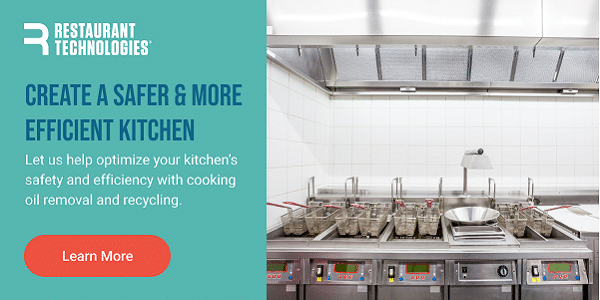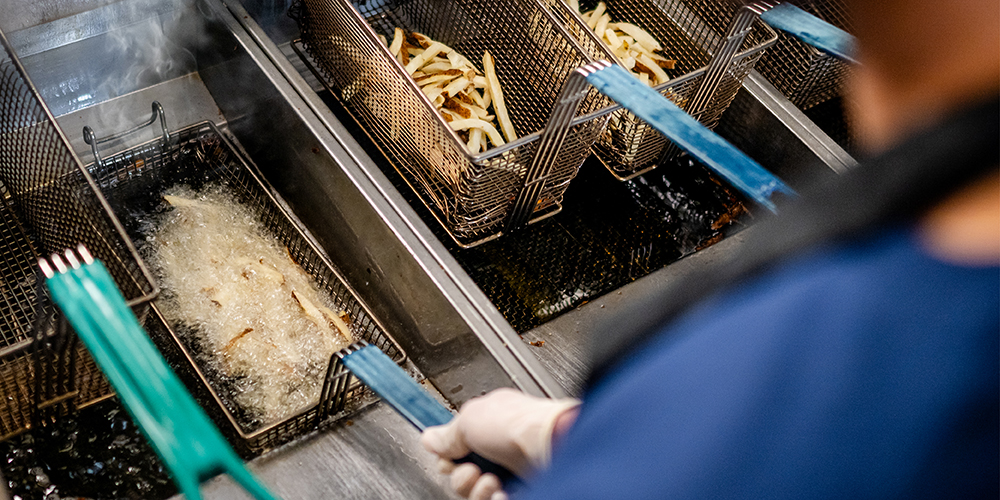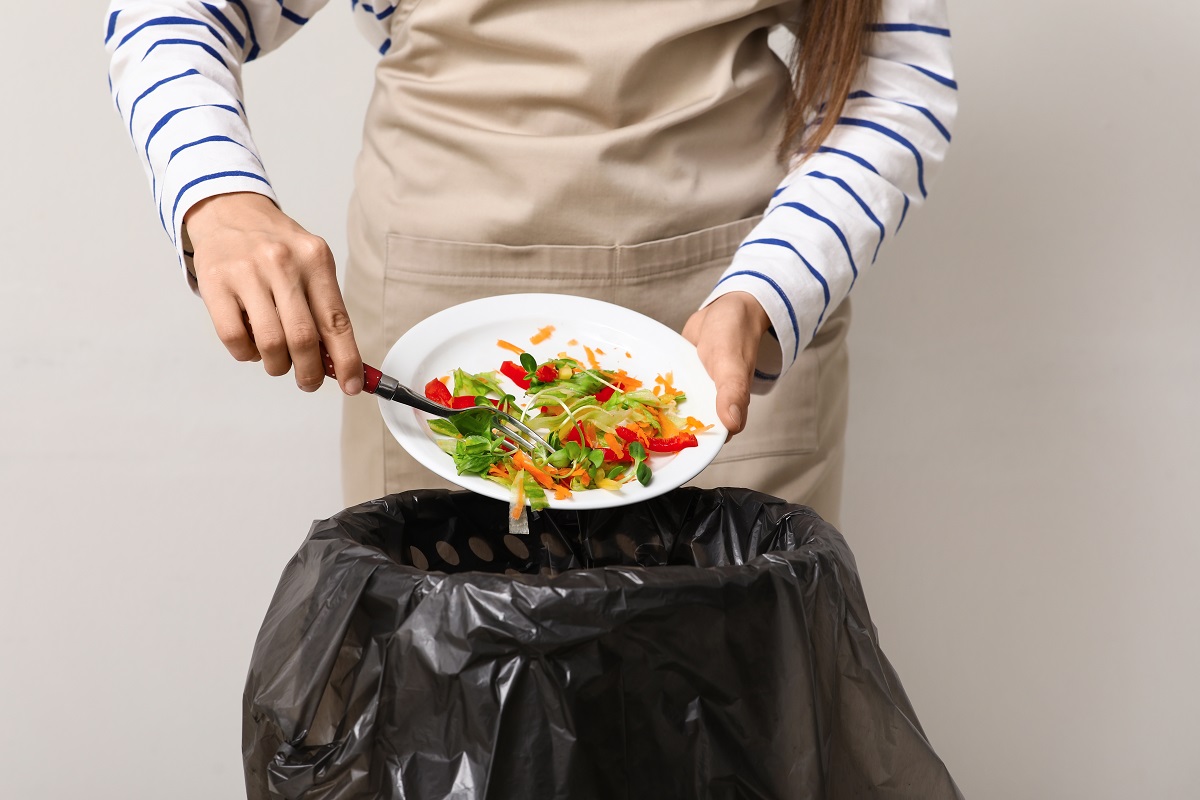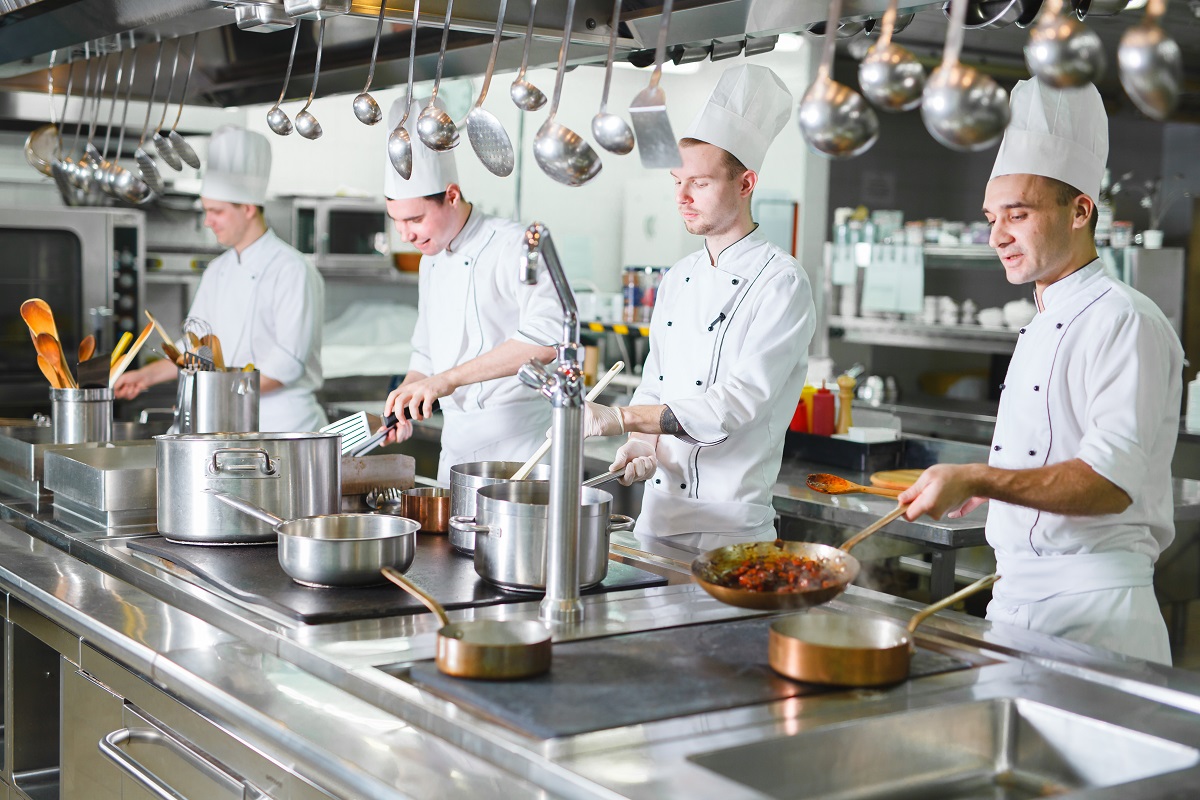In the fast-paced world of food service, where culinary creativity and customer satisfaction take center stage, it’s easy to overlook proper cooking oil disposal. Yet, this seemingly mundane task holds significant environmental implications and can greatly impact the longevity of your kitchen equipment. At Restaurant Technologies, we understand the vital role that responsible oil and grease management plays in sustaining both your business and the planet. Let’s delve into practical insights on how to recycle and dispose of used cooking oil, steering clear of common pitfalls and embracing sustainable practices.
Reusing Cooking Oil: Maximizing the Life of Your Oil
One of the key practices to adopt in your commercial kitchen is the safe reuse of cooking oil. Extend the life of your oil by implementing the following tips:
- Filter it Right: Use a fine mesh strainer to remove food particles. This simple step prevents the oil from degrading too quickly and maintains its quality for longer durations.
- Proper Storage: Store oil in a dark place to prevent premature degradation. Exposure to light can hasten the breakdown of oil, affecting both flavor and usability.
Storing Used Cooking Oil: A Guide to Preservation
Restaurant Technologies’ Total Oil Management System can filter and recycle your used cooking oil, making your kitchen safer and more efficient. However, without our automated system, proper fryer oil storage is paramount. Follow these guidelines to ensure its quality for future use:
- Cool Before Storing: Allow the oil to cool before storing it in a sealed container. Hot oil can deteriorate the container and affect the oil’s quality.
- Label for Freshness: Label containers with the type of oil and date to track freshness. This not only helps in identifying the oil but also allows you to monitor its storage duration.
- Shield from Elements: Keep stored oil away from direct sunlight. Exposure to the elements can accelerate the degradation of the oil.
Cooling and Solidifying Grease: A Safe But Outdated Approach to Disposal
Instead of wondering what to do with grease or pouring it down the drain, adopt the practice of cooling and solidifying it. This process offers several benefits:
- Clog Prevention: Reduces the risk of clogged drains and sewage issues. Hot grease can solidify in pipes, leading to blockages and costly repairs. Pouring oil down the sink is one of the most common mistakes in oil disposal.
- Easy and Safe Disposal: Facilitates easy and safe disposal in trash bins. Once solidified, grease can be handled like any other solid waste, minimizing environmental impact.
- Environmentally Friendly: Solidified grease is easier to collect and dispose of, reducing the likelihood of it entering waterways and causing environmental harm.
Restaurant Technologies offers a safer and more efficient solution to this approach of cooling and solidifying grease. Our Total Oil Management system allows for a hands-free, easy way to recycle frying oil.

Grease Recycling Options: Supporting Eco-Friendly Practices
There are many benefits of recycling used cooking oil. Many municipalities have programs in place for collecting and repurposing used grease, contributing to a circular economy. Promote eco-friendly grease disposal by exploring local recycling facilities that accept cooking grease, or take the following steps:
- Establish Community Partnerships: Establish partnerships with local recycling centers to ensure a seamless and sustainable disposal process.
- Educate Staff: Educate your kitchen staff on the importance of separating grease for recycling. A collective effort ensures that your establishment actively participates in environmental initiatives.
How to Dispose of Used Cooking Oil: Community Programs and DIY Methods
Participate in community programs that facilitate the collection of used cooking oil. This not only ensures proper disposal but also strengthens your ties with the local community:
- Community Engagement: Actively engage with local collection programs, showcasing your commitment to responsible waste management. This involvement can enhance your business’s image within the community.
- Promotional Opportunities: Collaborate with collection programs for promotional opportunities. Highlight your sustainable practices in marketing materials, attracting environmentally-conscious customers.
DIY Disposal Methods
For at-home oil disposal, consider these safe methods:
- Absorb with Paper Towels: Absorb used oil with a paper towel and dispose of it in the trash. This method is efficient and prevents oil from contaminating other waste.
- Non-Culinary Use: Use old oil for non-cooking purposes, such as lubricating tools or hinges. Transforming waste into a useful resource aligns with sustainability goals.
Environmental Impact: The Consequences of Improper Disposal
Discussing Environmental Consequences
Improper disposal of cooking oil can have severe environmental consequences, including:
- Water Pollution: Clogged drains contribute to water pollution, affecting both aquatic ecosystems and water quality.
- Impact on Aquatic Life: When even a small amount of oil reaches water bodies, it can harm aquatic life by disrupting habitats and contaminating the food chain.
- Soil Quality: Improperly disposed oil can seep into the soil, compromising its quality and affecting plant life.
Benefits of Responsible Oil Management
Embrace responsible oil management for the following benefits:
- Environmental Sustainability: Contribute to a healthier planet by minimizing the negative impact on natural resources.
- Longevity of Kitchen Equipment: Proper disposal prevents clogs and damage to pipes, ensuring the longevity of your kitchen infrastructure.
- Positive Community Relations: Showcase your commitment to environmental stewardship, fostering positive relations with your community and customer base.
Frequently Asked Questions (FAQs): Addressing Common Queries
Curious about the best ways to handle used cooking oil? Check out these frequently asked questions:
- Can I recycle cooking oil at home?
Yes, you can! Utilize local recycling programs or absorb the oil with paper towels for proper disposal.
- What is the proper way to store used cooking oil?
Store it in a cool, dark place in sealed containers, ensuring it is labeled for easy identification.
- Are there regulations for commercial cooking oil disposal?
Local regulations may vary, but partnering with local collection programs ensures compliance and responsible disposal.
- How does recycling cooking oil benefit the environment?
Recycling prevents pollution, conserves resources, and supports eco-friendly practices, contributing to a healthier environment.
- Can old cooking oil be used for non-culinary purposes?
Absolutely! Repurpose old oil for tasks like lubricating tools, showcasing a sustainable approach to waste management.
By adopting these best practices and integrating them into your daily operations, you not only contribute to a healthier environment but also enhance the sustainability and efficiency of your food service establishment. At Restaurant Technologies, we believe that every drop of used cooking oil matters, and responsible disposal is a cornerstone of culinary excellence and environmental stewardship. Let’s cook up a sustainable future, one conscientious oil disposal at a time.







